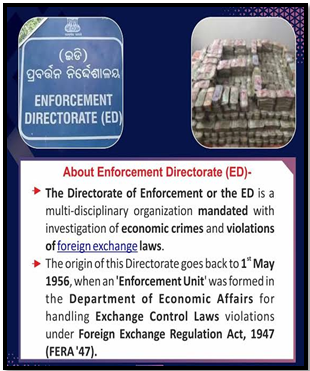SUPREME COURT LIMITS ED’S ARREST POWERS UNDER PMLA
Why in the news?
- SC criticises ED, insists PMLA arrests based on evidence.
- Questions ED’s inconsistent arrest policy, calls for fairness.
- Section 19(1) of PMLA grants ED significant arrest powers, and must uphold constitutional rights.
source:gbu
About Prevention of Money Laundering Act(PMLA):
- Objective: Prevent money laundering and confiscate illicitly obtained property.
- Enforcement: Managed by Enforcement Directorate (ED) under Ministry of Finance.
- Punishment: Offenders face rigorous imprisonment up to seven years and unlimited fines.
PMLA Enactment and Objectives:
- Enacted :in January 2003 to combat money laundering.
- Controls money laundering, confiscates laundered property, and addresses related issues.
- Proposes punishment under Section 4.
- Recent Amendments: 2019 amendment allows restoration claims for confiscated property; 2023 amendment expands NGO disclosure requirements and defines “Politically Exposed Persons” per FATF recommendations.
What is Section 19 of PMLA?
About Enforcement Directorate (ED):
Associated Article: https://universalinstitutions.com/the-pmla-a-law-that-has-lost-its-way/ |





